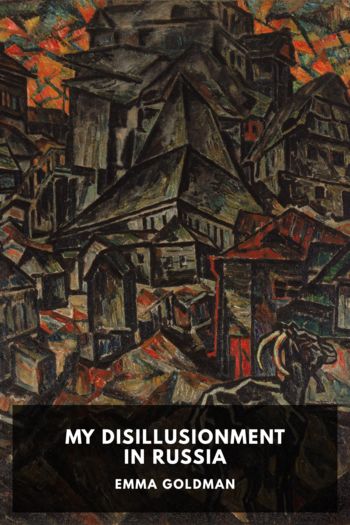My Disillusionment in Russia by Emma Goldman (books to read romance txt) 📕

- Author: Emma Goldman
Book online «My Disillusionment in Russia by Emma Goldman (books to read romance txt) 📕». Author Emma Goldman
I found Petrograd of 1920 quite a different place. It was almost in ruins, as if a hurricane had swept over it. The houses looked like broken old tombs upon neglected and forgotten cemeteries. The streets were dirty and deserted; all life had gone from them. The population of Petrograd before the war was almost 2,000,000; in 1920 it had dwindled to 500,000. The people walked about like living corpses; the shortage of food and fuel was slowly sapping the city; grim death was clutching at its heart. Emaciated and frostbitten men, women, and children were being whipped by the common lash, the search for a piece of bread or a stick of wood. It was a heartrending sight by day, an oppressive weight at night. Especially were the nights of the first month in Petrograd dreadful. The utter stillness of the large city was paralysing. It fairly haunted me, this awful oppressive silence broken only by occasional shots. I would lay awake trying to pierce the mystery. Did not Zorin say that capital punishment had been abolished? Why this shooting? Doubts disturbed my mind, but I tried to wave them aside. I had come to learn.
Much of my first knowledge and impressions of the October Revolution and the events that followed I received from the Zorins. As already mentioned, both had lived in America, spoke English, and were eager to enlighten me upon the history of the Revolution. They were devoted to the cause and worked very hard; he, especially, who was secretary of the Petrograd committee of his party, besides editing the daily, Krasnaya Gazetta, and participating in other activities.
It was from Zorin that I first learned about that legendary figure, Makhno. The latter was an Anarchist, I was informed, who under the Tsar had been sentenced to katorga. Liberated by the February revolution, he became the leader of a peasant army in the Ukraine, proving himself extremely able and daring and doing splendid work in the defence of the Revolution. For some time Makhno worked in harmony with the Bolsheviki, fighting the counterrevolutionary forces. Then he became antagonistic, and now his army, recruited from bandit elements, was fighting the Bolsheviki. Zorin related that he had been one of a committee sent to Makhno to bring about an understanding. But Makhno would not listen to reason. He continued his warfare against the Soviets and was considered a dangerous counterrevolutionist.
I had no means of verifying the story, and I was far from disbelieving the Zorins. Both appeared most sincere and dedicated to their work, types of religious zealots ready to burn the heretic, but equally ready to sacrifice their own lives for their cause. I was much impressed by the simplicity of their lives. Holding a responsible position, Zorin could have received special rations, but they lived very poorly, their supper often consisting only of herring, black bread, and tea. I thought it especially admirable because Lisa Zorin was with child at the time.
Two weeks after my arrival in Russia I was invited to attend the Alexander Herzen commemoration in the Winter Palace. The white marble hall where the gathering took place seemed to intensify the bitter frost, but the people present were unmindful of the penetrating cold. I also was conscious only of the unique situation: Alexander Herzen, one of the most hated revolutionists of his time, honoured in the Winter Palace! Frequently before the spirit of Herzen had found its way into the house of the Romanovs. It was when the Kolokol, published abroad and sparkling with the brilliancy of Herzen and Turgenev, would in some mysterious manner be discovered on the desk of the Tsar. Now the Tsars were no more, but the spirit of Herzen had risen again and was witnessing the realization of the dream of one of Russia’s great men.
One evening I was informed that Zinoviev had returned from Moscow and would see me. He arrived about midnight. He looked very tired and was constantly disturbed by urgent messages. Our talk was of a general nature, of the grave situation in Russia, the shortage of food and fuel then particularly poignant, and about the labour situation in America. He was anxious to know “how soon the revolution could be expected in the United States.” He left upon me no definite impression, but I was conscious of something lacking in the man, though I could not determine at the time just what it was.
Another Communist I saw much of the first weeks was John Reed. I had known him in America. He was living in the Astoria, working hard and preparing for his return to the United States. He was to journey through Latvia and he seemed apprehensive of the outcome. He had been in Russia during the October days and this was his second visit. Like Shatov he also insisted that the dark sides of the Bolshevik regime were inevitable. He believed fervently that the Soviet Government would





Comments (0)